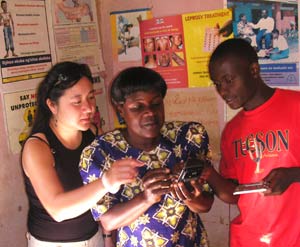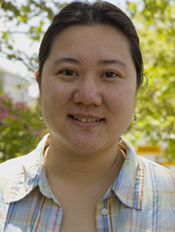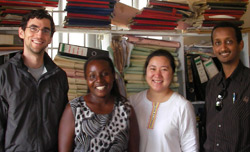UC Berkeley Press Release
Bringing 'tools of the west' to
sub-Saharan healthcare
For her networking innovations
in developing nations, Ph.D. student Melissa
Ho wins
Yamashita 'Foundations of Change' Award
 School of Information grad student Melissa Ho (left) examines a mobile phone with a healthcare worker at a Uganda hospital and student collaborator Shaffeque Abbasa, a Ugandan East Africa Blum Fellow. |
BERKELEY – "Compassion" and "computer networking" are words rarely uttered in the close proximity of a single sentence. But for grad student Melissa Ho they tumble out easily, together, when speaking of projects that have taken her to far reaches of Africa, where she's left her heart.
A Ph.D. candidate at UC Berkeley's School of Information (iSchool), Ho did a course correction in her mid 20s while working as a software developer at a Silicon Valley startup. Asking herself where her passion lay, she decided to use her inventive technical skills to benefit some of the world's poorest.
The idea was to use simple, rather than highly sophisticated, computer-networking tools to provide sustainable services to marginalized communities in the developing world. One might, for instance, have someone with Internet access in a city transport e-mail messages back and forth to remote villages on a data-storage device. Or set up a case-consultation network between healthcare providers in village clinics and doctors as far away as the United States. Or relay information between local healthcare clinics and regional hospitals via a series of wireless antennas and routers.
 Melissa Ho (Cathy Cockrell photo) |
In reality there's often a wide divide between such ideas and their successful execution on the ground. Ho counts herself lucky to have landed a year-long internship at Intel Research Berkeley — an industry-university collaboration and one of the premiere research groups looking at information-technology (IT) applications for development — and to have enrolled at the iSchool, where computer technology is studied in conjunction with the social sciences. That's a combination "I'd always been interested in," she says, "but not had the courage or time to break out and try."
In 2004 and 2005, a group from UC Berkeley's Technology and Infrastructure for Emerging Regions (TIER) went to India to help set up a wireless network connecting village eye clinics with Aravind Eye Hospitals, an Indian organization whose goal is to eliminate preventable blindness. Ho was one of the group, and remembers it as "a good experience, because we encountered obstacles, like power problems, that we hadn't thought about." She has since traveled extensively in Ghana, Congo, and Uganda implementing IT projects in the healthcare arena.
"A technologist combined with an ethnographer," as she calls herself, Ho's field work in the developing world, combined with her academic studies, have left her keenly aware that any new introduction of technology disrupts older ways of doing things. "It could easily be positive or negative, probably both," she cautions. "So it's important to build up an understanding of what's going on, before going in and putting in technology. Not just saying 'computers are going to save the third world.'"
For her nuanced and dogged efforts to use "the tools of the West to benefit the rest," in the words of classmate and admirer Rowena Luk, Ho has been given the 2008 "Foundations of Change" Thomas I. Yamashita Award. "I found this project just astonishing," said Rachel Moran, director of the campus's Institute for the Study of Social Change (ISSC), which administers the prize. "Even though you go from country to country, you leave something behind, an infrastructure that endures, with a whole set of possibilities … for imagining something different," she told Ho. "It's a tremendously creative and entrepreneurial thing that you are doing."
Ho was born in Memphis, Tenn. to immigrant parents and grew up in St. Louis, Mo., the oldest of three children. A "math geek" as a child, she earned her bachelor's degree in computer science at Cornell University and her master's degree in computer networking at University College London.
The NewsCenter recently caught up with Ho in Berkeley. Here is some of what she had to say.
Learning process in India
In summer 2004 I went to India for the first time,
with the TIER research group. We were in southern
Tamil Nadu, working with the Aravind Eye Hospital.
The idea was to use highly available technology,
like Wi-Fi, take that hardware and reuse it, try
to connect the hospital directly to the village
clinics using a wireless link.
While we were there we were encountering things like power problems. The power in India goes out if not once a day, then several times a week. So whenever the power goes out, the network connection goes out, too. In this particular location, they dealt with this problem using solar panels and a bank of batteries; so we didn't think that power would be a problem. We'd test the link late at night, only to find each night that the link had gone down again.
After a few days, we found out that at night, to save power and batteries, they shut down all the power in the village center. That was the right thing for them to do. But it didn't cross their minds to tell us, and it didn't cross our minds to ask. Once we realized what was happening, we asked them to leave the power on while we were testing the link, and everything worked. It was a hard way to figure out a simple problem, but it was a good learning process
Ghanaian healthcare
I went to Ghana in December 2005 to do a
wireless deployment, to connect several universities
together, so as to create a local research network
not involving the large cost of an Internet service
provider. By chance I had decided to go two weeks
early, with phone numbers of two Ghanaian doctors,
friends of friends. I called them and said "Hey,
it would be great to find out what you're doing,
and to think about ways to use technology to address
the problems you have here. What are the primary
problems that you face in health care? What have
you heard about online medical records? Is that
something you want for your health clinic?" I
talked to a lot of doctors, snowballing from the
original contacts.
| 'I
wanted to combine my computer-science skills with
what I was really broken-hearted about.' |
Based on those conversations, I got the idea to set up a social-networking application, which doctors in Ghana could use to communicate with other doctors in Ghana or in the United States. Primarily for patient-case descriptions, where the local doctors aren't sure what the diagnosis should be, or how to treat the problem. My idea was that instead of having to access a live website through a slow Internet connection, they would send their data to a local server, in each hospital, which would send updates to all the other sites overnight, through the modem.
I pitched this idea to one of the masters students at Berkeley, a member of the Information, Communications Technology, and Development reading group I was running. My colleague Rowena implemented this, and we went back to Ghana again to deploy that in four different hospitals.
'The continent that really breaks my heart'
I have a sense of conviction that this work is what
I'm supposed to be doing — a combination
of reasoning and logic and faith that all comes
together for me: "You have computer-science
skills, and you want to make that available to
people who need it, and people who are largely
neglected."
I started to grow this compassion for what was going on in Africa. Many people think of Africa as one continent, a uniform blob of black people. They don't bother looking deeply about it.
Thinking about that, and that God wants me to be compassionate, kicked off something in me; I really wanted to help people in Africa. Africa is where my heart is. I know that there's need in China, where my parents are from, and Southeast Asia. But the continent that really breaks my heart, because of the suffering and sheer neglect, is Africa. I wanted to combine my computer-science skills with what I was really broken-hearted about.
Crossing disciplinary boundaries
When I found out there was an Information School
at Berkeley, I realized this might be a place where
computer science skills would be useful, but where
I'd also have the opportunity to explore development
theory and policy angles in developing regions.
You're given the opportunity to cross disciplines,
to combine social science and computer science,
and to think very, very reflexively about where
technology has been, where it's going, and where
it needs to go.
|
For my Ph.D. dissertation I'll be working in Uganda, in a province where they're using vouchers as a means of paying health clinics for the number of patients they've seen. It's a good program but it's very paper intensive. One of the students evaluating that program, Ben Bellows, is in Berkeley's School of Public Health, in epidemiology. He realized that one of the big bottlenecks that the clinics face is the time it takes to process claims. It's taking 30 to 60 days to process these claims, even longer if there are any errors in the claim.
I'd like to look at how they store, organize, and retrieve data. If we can push the data entry into the hands of the people in the clinics, using mobile phones, it could reduce time to process claims, and also help them produce more accurate claims. Mobile phones are well suited to developing regions, because they have batteries, they're not dependent on power, which often is out. They also have communications capabilities built in, and there's more infrastructure to maintain mobile phones than PCs. With a cell phone it's easy to take it to get repaired, or possibly buy a new one.
My dissertation question is basically how does the introduction of cell phones change the social dynamics within the healthcare system? I'm basically a technologist combined with an ethnographer. I try to question and understand how technology should fit in — realizing that the technology you put in is going to be a disruption. It could easily be positive or negative, probably both. So it's important to build up an understanding of what's going on. Not just saying "computers are going to save the third world."
'Appropriatable' technology
| 'Ironically, the best IT projects are the ones that
become invisible, the ones that become so useful
that people no longer talk about the underlying technology.' |
Ironically, the best IT projects are the ones that become invisible, the ones that become so useful that people no longer talk about the underlying technology because they are more interested in the way people are using it. Like long-distance wireless networks being used for rural eye care in India, or even simpler things like being able to use your ATM card in a cash machine halfway around the world.
Technology is not a panacea for righting all social wrongs, nor is it a grand evil being imposed "by the west on the rest." It's a tool — one of many means by which we can try to shape social change.


